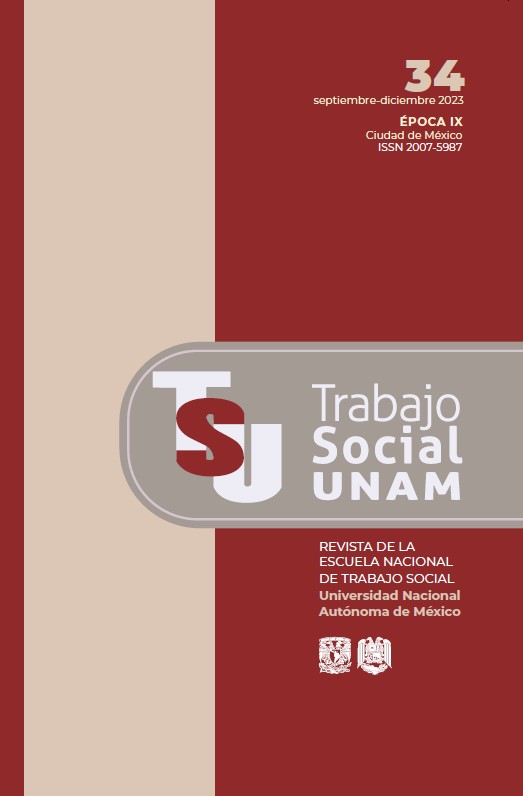Comportamientos de riesgo entre jóvenes
Main Article Content
Abstract
To inquire about the possible causes triggering the involvement of young people in social conflicts is to delve into the characteristics of the interrelationships between individuals comprising the issue. Throughout this work, an analytical framework is proposed that enables us to comprehend the relationship between emotions anchored to the social structure and the characteristics defining power and status relations among young people. Drawing on the theoretical contributions of Theodore Kemper (2007) and J.M. Barbalet (2001) regarding power and status, these serve as reference points for the analysis in this study.
Article Details
Citas en Dimensions Service
References
Barbalet, J.M. (2001) Emotion, Social Theory and Social Structure. A macrosociological approach, Cambridge University Press, Reino Unido, capítulo I, pp. 8-28.
Consejo Nacional de Evaluación. (2012). Recuperado de: http://www.coneval.org.mx/Paginas/principal.aspx
Instituto Nacional de Estadística y Geografía (INEGI). 2020, disponible en: https://inegi.org.mx/programas/ccpv/2020/
Informe del Programa Nacional para la Prevención Social de la Violencia y la delincuencia (PRONAPRED) 2015. Recuperado de: http://www.dof.gob.mx/nota_detalle.php?codigo=5343087&fecha=30/04/2014
Instituto Nacional de Estadística y Geografía e Informática. (2015). Encuesta Intersensal 2015, principales resultados. Recuperado de: http://www.inegi.org.mx/est/contenidos/proyectos/encuestas/hogares/especiales/ei2015/doc/eic_2015_presentacion.pdf
Kemper, Theodore (2006), “Power and Status and the Power-Status Theory of Emotions”, en Jan E. Stets y J. H.
Turner (ed.), Handbook of the Sociology of Emotions, Springer, New York, pp. 87-11
Tello, N. (2009). Jovenes: ¿víctimas, delincuentes o futuros ciudadanos?, Instituto para la seguridad y la democracia A.C (Insyde).
Turner, Jonathan H. “The stratification of emotions: some preliminary generalizations”. Sociological inquiry 80, núm. 2 (mayo 2010).
Organización Iberoamericana de Juventud. (2013). Intervenir para trasformar, la juventud Como Protagonista del desarrollo. Recuperado de: http://www.oij.org/file_upload/publicationsItems/document/20141023131557_25.pdf
Reguillo, R. (Coord.) (2010). Los jóvenes en México. México: Fondo de Cultura Económica.
Tello, N. (2013). Características sociales de los adolescentes que tienen problemas con la violencia y con la ley en el D.F. México: EOPSAC.
Weber, Max. 1946. From Max Weber: Essays in Sociology. Translated and edited by H. H. Gerth and C. W. Mills. New York: Oxford University Press
Secretaria de Bienestar (2023) Informe Anual sobre la situación de Pobreza y rezago social, Ciudad de México. En: https://www.gob.mx/cms/uploads/attachment/file/792955/09010.AlvaroObregon23.pdf
INEGI (2023). A propósito del día internacional de la juventud. Datos nacionales. https://www.inegi.org.mx/contenidos/saladeprensa/aproposito/2023/EAP_JUV23.pdf
Memoria, diálogo y escritura, Philippe Lejeune, Historia y fuente oral No. 1 (1989), pp 33.67, http://www.jstor.org/stable/27753228.
Animal Político (2022) México destruyendo el futuro. En: https://www.animalpolitico.com/mexico.destruyendo-el-futuro
CONEVAL (2021) Módulo de índicadores de los programas y acciones de desarrollo social: https://sistemas.coneval.org.mx/SIMEPS/MIR.aspx?pIdMatriz=20000714&pCiclo=2020&pRamo=14&siglas=STPS&nombre=Jóvenes%20Construyendo%20el%20Futuro
Inegi (2023) Informe a propósito del día internacional de la lucha contra el uso indebido y el tráfico ilícito de drogas: https://www.animalpolitico.com/mexico-destruyendo-el-futuro
González, R (2010) La gestión de la violencia escolar. UPN.
